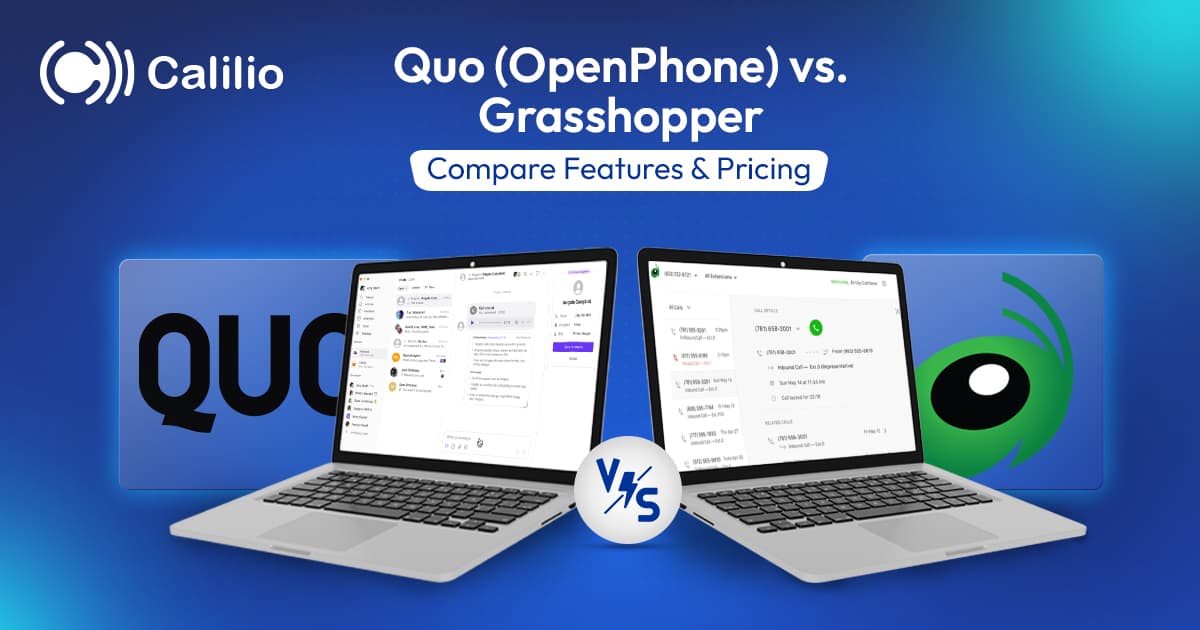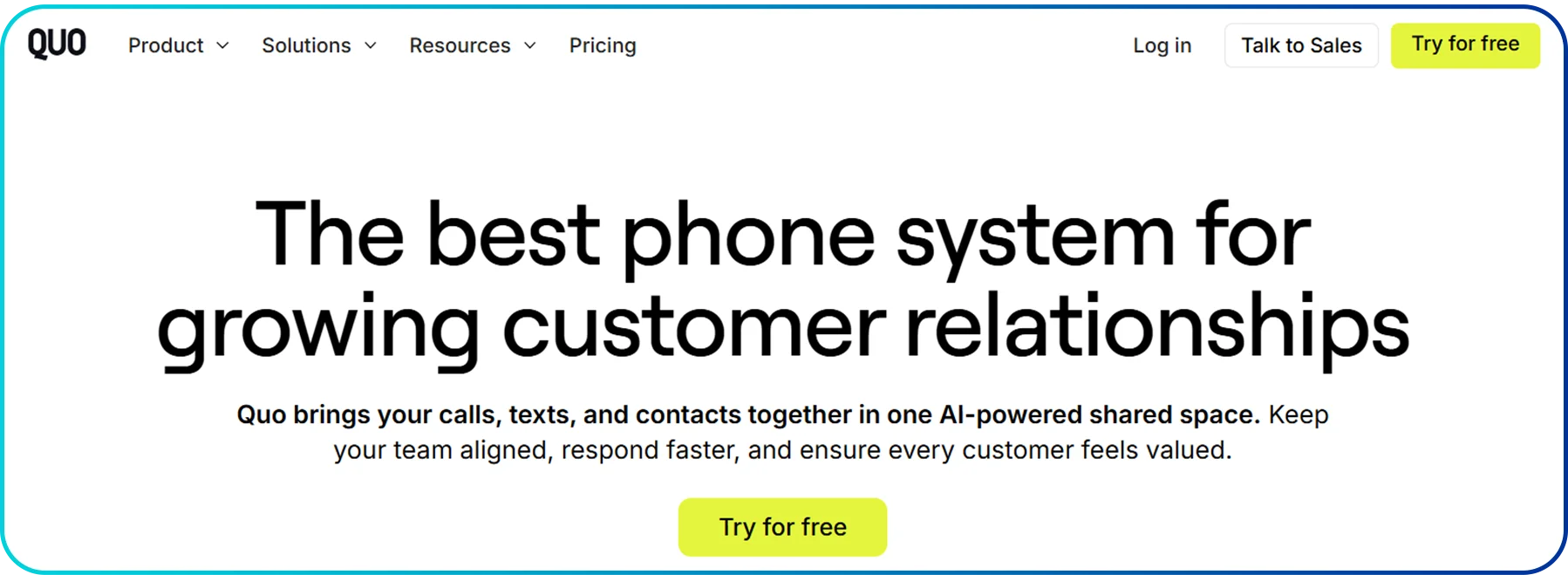Quo (OpenPhone) vs. Grasshopper: Which Phone System is the Best?

As businesses move away from traditional landlines, cloud-based phone systems have become the smarter way to communicate. Among the many options are the two popular platforms: Quo, formerly known as OpenPhone, and Grasshopper.
While both of these platforms offer virtual business numbers, calling and texting features, they’re designed for different types of teams and business needs.
In this blog, we’ll compare Quo vs. Grasshopper in detail, covering features, pricing, and usability to help you choose the one that truly fits your business.
Key Highlights:
Quo (OpenPhone) is a VoIP system designed for startups and remote teams, offering collaboration tools, integrations, and scalability.
Grasshopper is a simple virtual phone system made for solopreneurs and small businesses that need a professional phone setup without the complexity.
OpenPhone focuses on collaboration and scalability, while Grasshopper prioritizes simplicity and essential call management features.
Calilio combines the teamwork of OpenPhone and the simplicity of Grasshopper, offering global numbers, AI insights, and advanced features.
Quo Overview
Quo, previously called OpenPhone, is a cloud-based phone system designed for growing teams and startups, prioritizing collaboration and integration. It operates through VoIP technology, where all calls are made over the internet rather than through physical phone lines. OpenPhone offers several features that aim to enhance team collaboration, such as shared inboxes, call forwarding, and integrations with popular business tools like HubSpot, Slack, and Zapier. The platform is particularly known for its flexibility, making it ideal for small teams and startups that need a scalable solution.
OpenPhone offers several features that aim to enhance team collaboration, such as shared inboxes, call forwarding, and integrations with popular business tools like HubSpot, Slack, and Zapier. The platform is particularly known for its flexibility, making it ideal for small teams and startups that need a scalable solution.
Pros and Cons of Quo
Pros Cons Intuitive and easy-to-navigate interface. Robust team collaboration features. Automatic call transcripts and summaries. Unlimited calling and text messaging within the US and Canada. Occasional call quality issues, causing call drops and delays Some users have reported unresponsive customer support. Analytics and reporting are locked in higher-tier plans..
Grasshopper Overview
Grasshopper is a virtual phone system tailored specifically for solopreneurs and micro-businesses who need a simple, professional phone system. Its primary function is to separate business and personal calls on a single mobile device by providing a dedicated business number. Grasshopper offers fundamental virtual phone features such as multiple extensions, custom professional greetings, and voicemail transcription. Its simplicity and user-friendliness are ideal for businesses that need basic call management features with minimal setup.
Grasshopper offers fundamental virtual phone features such as multiple extensions, custom professional greetings, and voicemail transcription. Its simplicity and user-friendliness are ideal for businesses that need basic call management features with minimal setup.
Pros and Cons of Grasshopper
Pros Cons Unlimited users and extensions at no extra cost. Unlimited business text and calls. Mobile and desktop apps for on-the-go use. Provide a local, toll-free, or vanity number. Mobile and desktop applications can be unstable. Lacks heavy integration capabilities. Hidden or additional cost for add-ons.
Quo (OpenPhone) vs. Grasshopper: Key Differences Explained
Quo and Grasshopper differ mainly in collaboration and scalability. Quo offers modern tools like shared inboxes, CRM integrations, and team messaging for startups and remote teams, while Grasshopper focuses on basic call handling features for small businesses seeking a simple, modern phone system.
1. Pricing
Grasshopper starts at $18/month, making it an affordable option for solopreneurs. In contrast, Quo delivers more value for growing teams with collaboration and integration tools starting at $19/user/month.
Here’s a look at the detailed pricing and plans of Quo and Grasshopper:
Quo (Billed Annually) | Grasshopper (Billed Annually) |
| Starter: $19/user/month | True Solo: $18/month |
| Business: $33/user/month | Solo Plus: $32/month |
| Scale: $47/user/month | Small Business: $70/month |
2. Features and Functionality
Quo offers features like team messaging, call notes, multi-level IVR and CRM integrations, designed to enhance team efficiency. Meanwhile, Grasshopper focuses on essentials such as call forwarding, voicemail, and virtual extensions, offering a simpler business phone system.
Here’s a comparison table of key features offered by Quo and Grasshopper.
Feature | Quo (OpenPhone) | Grasshopper |
| Virtual business phone number | ✔ | ✔ |
| Call forwarding | ✔ | ✔ |
| Business texting (SMS) | ✔ | ✔ |
| Mobile + desktop apps | ✔ | ✔ |
| Call recording | ✔ | ✔ |
| Voicemail transcription | ✔ | ✔ |
| Shared phone number | ✔ | ✔ |
| Custom greetings/voicemail greetings | ✔ | ✔ |
| Ring groups & advanced call routing | ✔ | ❌ |
| AI-powered call transcription & insights | ✔ | ❌ |
| Multi-level IVR | ✔ | ❌ |
3. Target Audience
Quo is built with startups, remote teams, and tech-savvy businesses in mind. It focuses on helping growing teams stay connected through collaboration tools and shared communication spaces. Grasshopper, on the other hand, is built for small business owners and freelancers who want a simple phone system to manage calls without any complex setup or extra software.
4. Ease of Use
Quo offers a clean, modern interface built for quick onboarding. Users can set up accounts, assign numbers, and start making calls within minutes. Grasshopper, in contrast, offers a very simple setup process suitable for non-technical users.
5. Analytics and Reporting
Quo offers basic call insights and reporting tools, helping teams track performance and manage communication flow. Conversely, Grasshopper focuses more on daily business calls than on detailed call tracking or reporting.
6. Scalability
As businesses expand, Quo offers flexibility to add users, numbers, and integrations easily. It scales well for startups and growing teams that need shared communication tools. Whereas Grasshopper is suited for small teams or solopreneurs who prefer a simple, fixed setup without advanced scaling options.
7. Integrations and Automation
Quo integrates with popular tools such as HubSpot, Slack, and Zapier, helping teams automate workflows, sync contacts, and manage leads efficiently. On the other hand, Grasshopper provides very few third-party integrations and lacks automation features, focusing more on call handling than workflow management.
The table presented below breaks down how Quo and Grasshopper differ from each other across pricing, features, integration, and more.
Aspect | Quo (OpenPhone) | Grasshopper |
| Pricing | Starts at $19 per user per month. | Starts at $18 per user per month. |
| Features | Includes shared inboxes, team messaging, call notes, CRM integrations, and AI-powered call transcription. | Focuses on essentials like call forwarding, voicemail, business texting, and virtual extensions. |
| Target Audience | Ideal for startups, remote teams, and growing businesses. | Best for small business owners, freelancers, and solopreneurs. |
| Ease of Use | Modern interface with quick setup, suitable for tech-savvy teams. | Simple setup with minimal learning curve, designed for non-technical users. |
| Analytics and Reporting | Provides basic call insights, summaries, and performance tracking. | Limited reporting features; mainly focuses on daily call management. |
| Scalability | Highly scalable; easily add users, numbers, and integrations as the team grows. | Limited scalability; best for small, static teams with basic telephony needs. |
| Integrations and Automation | Integrates with most CRMs like HubSpot, Slack, Zapier, and other tools. | Very few integrations; lacks automation and CRM connectivity. |
Which One Should You Choose for Your Business: Grasshopper vs. OpenPhone?
If you need team features, remote access, and app integrations, choose OpenPhone, but if you’re running a solo or very small operation and just need basic calling and texting, Grasshopper fits better.
Choose OpenPhone If:
- Your team needs modern collaboration tools like sharedinboxes, call notes, and team messaging.
- Your business is remote or distributed, and you need seamless access via web, desktop and mobile.
- You use CRM tools or want workflow automation through integrations like HubSpot, Slack, or Zapier.
- You’re planning for growth and need a phone system that supports more users, complex call routing, and scalability.
Choose Grasshopper If:
- You’re a freelancer, solopreneur, or small business owner whoneeds a straightforward, affordable phone solution.
- Your business doesn’t rely on integrations or advanced call routing.
- You want a simple setup for handling calls, voicemails, and texts without advanced collaboration needs.
Connect Smarter with a Phone System Designed for Today’s Business Needs
Calilio: Best Alternative to Quo (OpenPhone) & Grasshopper
Both Quo and Grasshopper offer modern phone solutions, but serve different needs. Quo suits growing teams that need collaboration, integrations, and flexibility, while Grasshopper fits small businesses and freelancers who want a simple and easy-to-use phone system.
If you want a platform that combines the simplicity of Grasshopper with the teamwork and flexibility of OpenPhone, Calilio is the best choice. It’s a cloud-based business phone system that lets you make and receive calls globally with virtual phone numbers in 100+ countries. Its AI-powered call reports provide transcriptions, summaries, sentiment analysis, and reasons for calls, helping teams improve communication and customer service.
What sets Calilio apart is how it blends advanced functionality with cost efficiency. Starting at just $15 per user per month, it offers tools like IVR, Call Queue, Power Dialer, and Custom Caller ID to help teams stay organized and connected.
Summarize this blog with:
Frequently Asked Questions
Can I port my existing number to OpenPhone or Grasshopper?
Yes, both OpenPhone and Grasshopper let you port your existing business number. The process is simple: you provide your current number details and a recent bill, and once verified, your number transfers smoothly without disrupting your business calls.
Are there cheaper or more feature-rich alternatives to OpenPhone and Grasshopper?
Which phone system is a better fit for small businesses vs. growing teams?

Still have questions?
Can’t find the answer you’re looking for? Please chat with our friendly team.
Stay in the loop
Get the latest call insights, trends, and updates delivered straight to your inbox.
By subscribing, you agree to receive updates from Calilio.
You can unsubscribe anytime.
